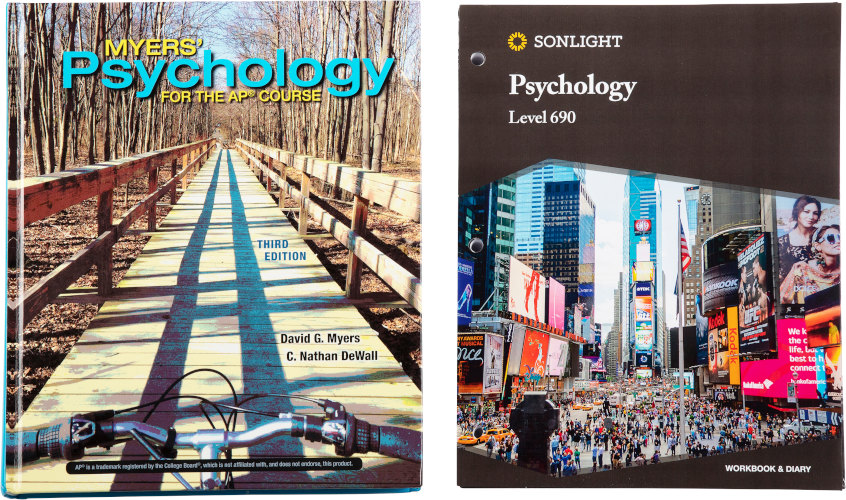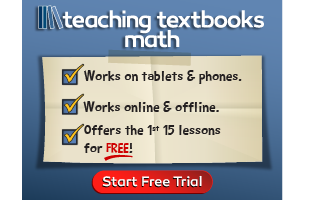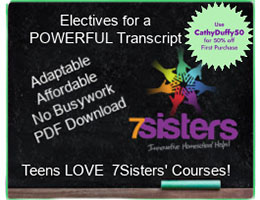Sonlight’s Psychology Level 690 course uses an Advanced Placement (AP)® textbook and a study guide to present a two-semester psychology course for high school students that prepares them to take the AP Psychology Exam®.
Sonlight is a Christian publisher, but since there is no AP level psychology textbook written from a Christian point of view, the course uses the hardcover secular textbook, Myers' Psychology for the AP Course by David G. Myers and C. Nathan DeWall. (This textbook is on the Example Textbook List of textbooks that meet the College Board's requirements for AP Psychology.) The study guide by Jeffrey G. Corson, titled Sonlight Psychology Level 690: Workbook & Diary, adds a Christian perspective when appropriate. It has more than 500 pages of lesson plans, questions, assignments, answer keys, and commentary on the textbook material. The Workbook & Diary comes as a set of pre-punched pages for you to insert into your own binder.
The textbook is well written and has plenty of real-life applications, graphics, visuals, and cartoons to make it interesting. Sidebars show the goals for each module, then highlight key terms as students read through the material. Sidebars sometimes have quotations, notes, images, or AP Exam tips that are useful and occasionally entertaining.
The textbook’s authors are supportive of religious beliefs. They also exhibit an awareness that religious believers might sometimes have problems with the content of this textbook that mirrors the assumptions of the scientific establishment in treating the theory of evolution as a foundational, unifying principle of science. Their awareness of potential problems is evidenced in a sidebar on page 143 where they encourage students to think of religion and science as complementary rather than in conflict. They say, “[T]he scientific account attempts to tell us when and how; religious creation stories usually aim to tell about an ultimate who and why.” Also, on page 148, they try to reinforce the idea that religious believers can also believe in evolution citing examples of famous Christians from both past and present. However, in attempting to do this, the authors' selective use of quotations and examples is sometimes misleading. Still, it's important to note that the authors mention the positive effects of religion, such as greater-than-average happiness for those active in faith communities (p. 478) and lower rates of suicide among those who are religious (p. 67).
In the Workbook & Diary, Corson writes directly to students in a personal tone that is engaging. He tries to balance the textbook’s point of view by raising questions and providing contrary points of view in Scripture passages. However, he seldom presents well-developed arguments for other viewpoints. Instead, he generally leaves it to students to think for themselves by prodding them with assignments such as, “Explain natural selection and then critique it” and “Give a criticism of the evolutionary explanation of sexuality” (p. 59). Given that this Sonlight course was written for Christian homeschooling families, to get the most out of it, I would recommend that parents read through the most problematic sections, particularly Module 15 on evolutionary psychology and Module 53 on sexual development, and be prepared to have discussions on the topics covered. This might require additional research to be able to answer questions, such as those posed in the Workbook & Diary, or others that might arise.
In a medical field like psychology where secular ideas dominate over religious beliefs, it is difficult to find course material that is suitable for Christian students. Sonlight’s Psychology Level 690 provides a compromise solution that should work for most students. However, parents and students need to be on guard against the sometimes subtle indoctrination that occurs with a well-written textbook such as Myers' Psychology for the AP Course. Utilizing the assignments and questions in the Workbook & Diary and frequent discussions are both critical for helping students learn how to bring other points of view to bear on the subject matter.
How the Course Works
Both the textbook and the Workbook & Diary present the course material in 83 modules that are grouped within 14 units and one enrichment module. Weekly schedule charts in the Workbook & Diary show assignments for four days per week. Students should also use the textbook publisher’s web page where they will find supplementary videos and flashcards for practicing vocabulary. (The textbook shows the student when there is a video that ties in with a particular section of the material.)
The course is a little confusing because some components are in the textbook and others are in the Workbook & Diary. For instance, the textbook has “Check Your Understanding” questions interspersed throughout each module, and answers for those are near the back of the textbook. Then students will also answer “Opportunity Questions” for each module that are in the Workbook & Diary.
The course also has other types of questions, exercises, and experiments. Key points are summarized in a question-and-answer format at the end of each module for review purposes, and these are followed by multiple-choice questions and some practice FRQs (free response questions). Each unit in the textbook concludes with lists of the key terms, concepts, and contributors with which students need to be familiar; a set of multiple-choice questions; and two or three FRQs.
Unit exams are in the Workbook & Diary. Unit exams are cumulative, testing students on material learned through all prior units up to that point. The author explains to parents that tests for this course are purposely difficult–“harder than the AP test”–so that students will be well prepared (Workbook & Diary, p. 5).
Answer keys for questions and exams are included either in the textbook or the Workbook & Diary.
The course is designed primarily for independent study, but there are discussions, experiments, and activities that will require parental oversight and participation. Parents might trust students to use the answer keys to grade their work if the student is truly working toward passing the AP exam. Students (or parents) are told how to score the various course activities and record total unit scores on a “Grade Book” page at the end of the Workbook & Diary. Passing the AP Psychology Exam is the ultimate test as to whether or not students have learned the material, so it serves as an objective measure of accountability.
Parents need to read the “Note to Parents” on page 5 of Workbook & Diary. This is especially important for those with students who intend to take the AP Psychology Exam because it explains the timing of the course so that students are ready to take the exam, which is offered only in May of each year. This schedule requires students to start the course in August, although some students might be able to complete the course on an accelerated schedule. The course schedule allows a week or two at the end that can be dedicated to intensive test prep. Since the course is challenging, I recommend starting early in case students need more time to prepare for the exam.
Summary
Even though Sonlight’s Psychology Level 690 isn’t the perfect solution for Christian homeschoolers, it does an excellent job of preparing students for the AP Psychology Exam. And Sonlight and the Workbook & Diary author Jeffrey Corson both deserve appreciation for the difficult juggling task they undertook to create this course.










